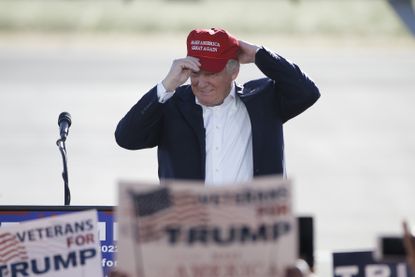Why Donald Trump would make China great again
Oh, the irony


Donald Trump famously promises to make America great again. But the one country poised to regain its global influence and economic might under a President Trump isn't the U.S. It's China.
Trump, as you probably know, is obsessed with the Asian power. He blasts the country's trade policies — the "greatest theft in the history of the world" — lurches between saying China is "killing" and "raping" the U.S., and promises its "days of currency manipulation and cheating are over" if he's elected president.
The irony is that China hasn't actually been doing so hot. Recently released data shows that the Chinese economy only grew by a 6.7 percent annual rate in the first quarter of 2016, its slowest quarter in seven years. And that's coming from the Chinese government, so the actual growth rate is probably even lower for a country grappling with poor export figures, a slowing rate of investment, and ballooning debt, among other challenges.
Subscribe to The Week
Escape your echo chamber. Get the facts behind the news, plus analysis from multiple perspectives.

Sign up for The Week's Free Newsletters
From our morning news briefing to a weekly Good News Newsletter, get the best of The Week delivered directly to your inbox.
From our morning news briefing to a weekly Good News Newsletter, get the best of The Week delivered directly to your inbox.
China's relations with its neighbors have also deteriorated. Once heralded for its peaceful rise, it has expanded its military presence in Asia, restricting sea travel lanes and claiming a number of island chains — notably the Paracels and the Spratleys — also claimed by other countries in the region. China is building artificial islands on top of these disputed areas, turning them into de facto military bases. This has seriously angered other Asian countries and is a source of rising tensions, pushing former foes like Vietnam into America's arms.
Against this backdrop, the next U.S. president might actually have a real opportunity to keep China's powers in check. But Trump would only squander it.
The first problem is that when it comes to the American military in Asia, Trump's motto seems to be speak loudly and carry a small stick.
He won't rule out a war with China, saying "we need unpredictability." Bafflingly, he's also called for both cutting the military budget and ensuring it's "funded beautifully." Perhaps most critically, he's also called on America's allies in Asia to pay for the presence of U.S. troops — basically likening an alliance to a protection racket. "How long will we go on defending South Korea from North Korea without payment?” he asked.
This could severely weaken America's position in the region and strengthen China's hand.
In an interview with The Wall Street Journal, Japanese Prime Minister Shinzo Abe was adamant about the stationing of American troops, stating: "I cannot conceive of any situation within the foreseeable future when the U.S. presence wouldn’t be necessary." There's a reason Japan pays nearly $2 billion a year to support the U.S. military presence, a fact that seems to be lost on Trump. "Trump's stance toward allies like Japan and South Korea would not simply wreck those alliances, but destabilize Northeast Asia's precarious balance," Van Jackson, a professor of security studies and fellow at the Center for a New American Security, writes at The Diplomat.
Jackson also points out that the presumptive GOP nominee has implied that he doesn't think the U.S. needs a "forward military presence" in Asia. As Tsuneo Watanabe, a researcher at a Japanese think tank, told The Japan Times, without the type of military deterrence that only the U.S. can provide in the Asia-Pacific, "China would do whatever it wants."
Trump's rhetoric on trade, likewise, runs counter to the role America must play in the region. One of Trump's favorite targets is the Trans-Pacific Partnership, the 12-nation trade pact finalized by the Obama administration but not yet passed by Congress. Trump has blasted the TPP, repeatedly calling it a "disaster" and a "horrible deal." But as with most of Trump's statements, the reality is quite different — the TPP is essential for U.S. objectives in Asia and China specifically.
In addition to the U.S. and Japan, the TPP also includes Brunei, Malaysia, Singapore, and Vietnam. By not including China, the agreement implicitly seeks to mitigate China's economic hegemony in the region by further integrating the economies of the Asia-Pacific and the U.S. Trump's antipathy towards robust trade relations in East Asia leaves American allies subject to economic coercion from China.
Then there's the issue of America's trade with China itself. Despite the trade deficit, the U.S. still exports goods worth over $100 billion to the Asian powerhouse. So Trump's aggressive protectionism, which calls for a 45 percent tariff on all Chinese imports, could backfire badly. It could even hurt the American economy far more than it would hurt China's. Peter Petri, an economist at Brandeis, estimates that Trump's tariff "could cause the U.S. total merchandise trade deficit to grow by $67 billion." Caroline Freund, a senior fellow at the Peterson Institute for International Economics, says such an import tax would "tremendously" hurt poor Americans because it would increase prices for products they most rely on. Moody's Analytics has predicted that a broader Trump trade war would cost the U.S. millions of jobs.
A combination of uncompromising protectionism and military downsizing is the worst path that America could take to keep China in check. Though China has been a bogeyman for Trump on the campaign trail, it only stands to win if he becomes president.
Sign up for Today's Best Articles in your inbox
A free daily email with the biggest news stories of the day – and the best features from TheWeek.com
Benjamin Shull is an assistant books editor with The Wall Street Journal and a contributor to The Week. Follow him on Twitter.
-
 The key financial dates to prepare for in 2025
The key financial dates to prepare for in 2025The Explainer Discover the main money milestones that may affect you in the new year
By Marc Shoffman, The Week UK Published
-
 Sudoku medium: December 19, 2024
Sudoku medium: December 19, 2024The Week's daily medium sudoku puzzle
By The Week Staff Published
-
 Codeword: December 19, 2024
Codeword: December 19, 2024The Week's daily codeword puzzle
By The Week Staff Published
-
 US election: who the billionaires are backing
US election: who the billionaires are backingThe Explainer More have endorsed Kamala Harris than Donald Trump, but among the 'ultra-rich' the split is more even
By Harriet Marsden, The Week UK Published
-
 US election: where things stand with one week to go
US election: where things stand with one week to goThe Explainer Harris' lead in the polls has been narrowing in Trump's favour, but her campaign remains 'cautiously optimistic'
By Harriet Marsden, The Week UK Published
-
 Is Trump okay?
Is Trump okay?Today's Big Question Former president's mental fitness and alleged cognitive decline firmly back in the spotlight after 'bizarre' town hall event
By Harriet Marsden, The Week UK Published
-
 The life and times of Kamala Harris
The life and times of Kamala HarrisThe Explainer The vice-president is narrowly leading the race to become the next US president. How did she get to where she is now?
By The Week UK Published
-
 Will 'weirdly civil' VP debate move dial in US election?
Will 'weirdly civil' VP debate move dial in US election?Today's Big Question 'Diametrically opposed' candidates showed 'a lot of commonality' on some issues, but offered competing visions for America's future and democracy
By Harriet Marsden, The Week UK Published
-
 1 of 6 'Trump Train' drivers liable in Biden bus blockade
1 of 6 'Trump Train' drivers liable in Biden bus blockadeSpeed Read Only one of the accused was found liable in the case concerning the deliberate slowing of a 2020 Biden campaign bus
By Peter Weber, The Week US Published
-
 How could J.D. Vance impact the special relationship?
How could J.D. Vance impact the special relationship?Today's Big Question Trump's hawkish pick for VP said UK is the first 'truly Islamist country' with a nuclear weapon
By Harriet Marsden, The Week UK Published
-
 Biden, Trump urge calm after assassination attempt
Biden, Trump urge calm after assassination attemptSpeed Reads A 20-year-old gunman grazed Trump's ear and fatally shot a rally attendee on Saturday
By Peter Weber, The Week US Published